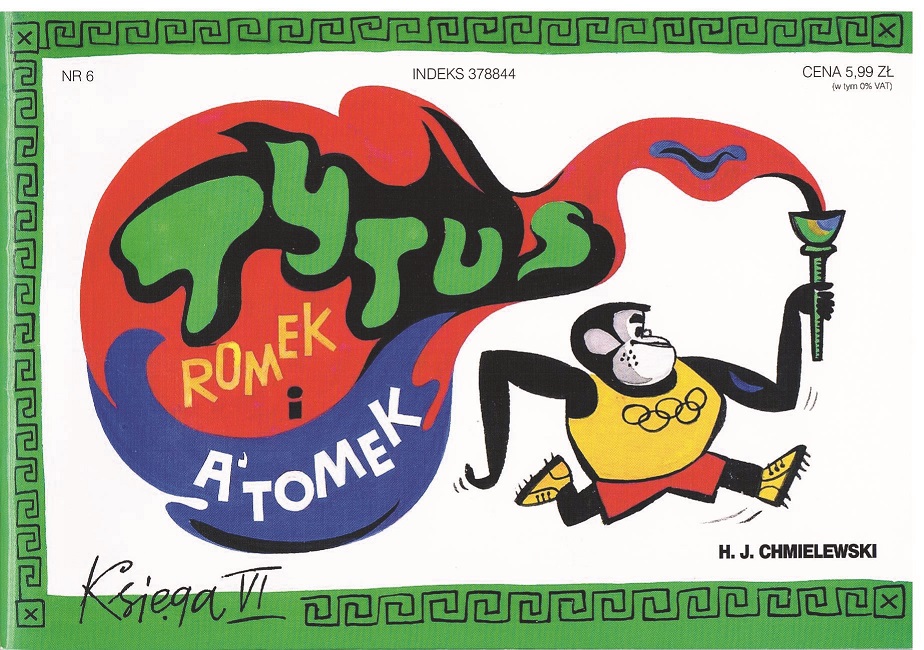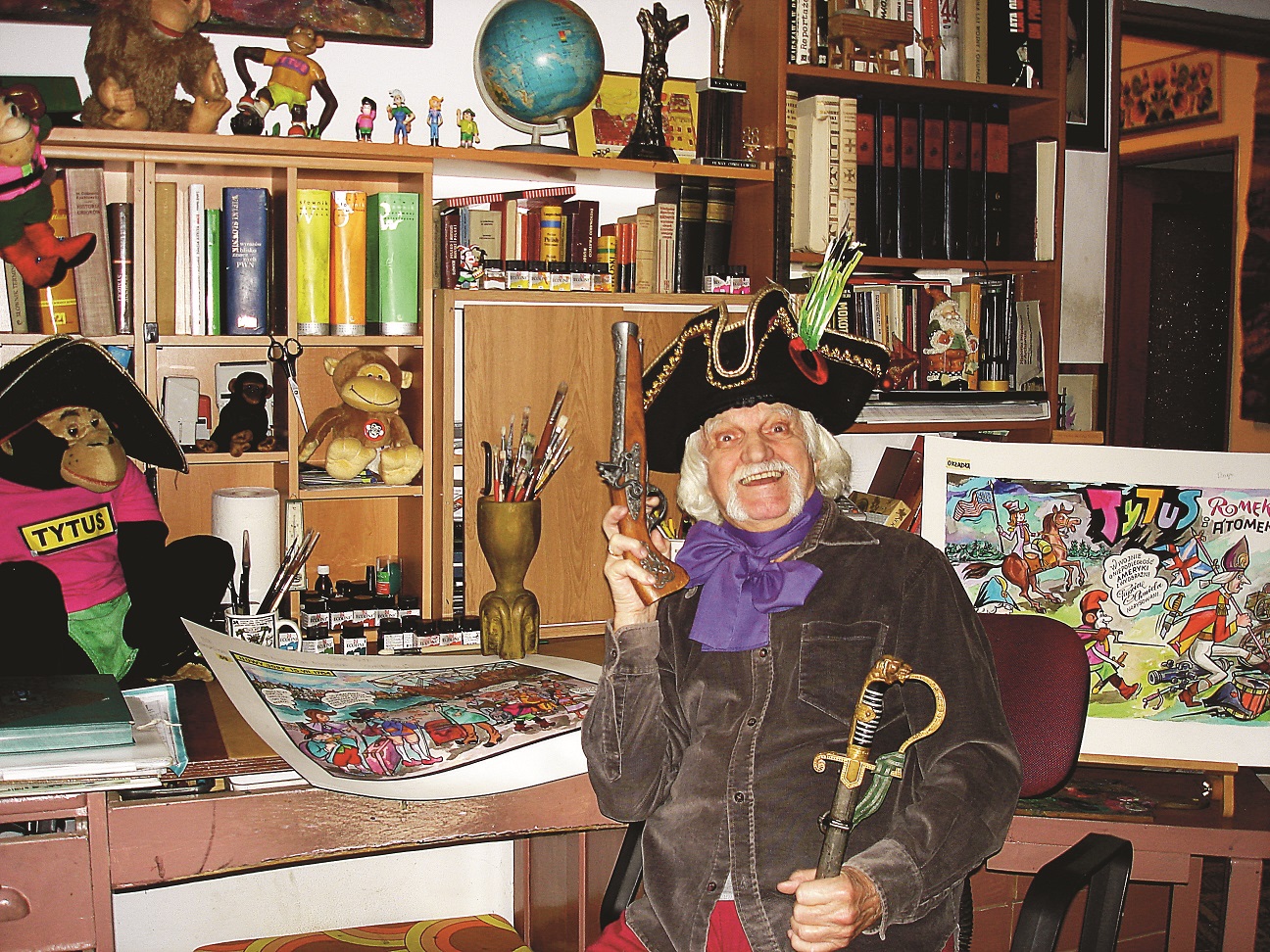Title of the work
Country of the First Edition
Country/countries of popularity
Original Language
First Edition Date
First Edition Details
H. J. Chmielewski, Tytus, Romek i A'tomek: Księga VI – Tytus olimpijczykiem. Warsaw: Wydawnictwo Harcerskie „Horyzonty”, 1971, 56 pp.
ISBN
Genre
Action and adventure fiction
Comics (Graphic works)
Historical fiction
Humor
Mythological fiction
Target Audience
Crossover (Children and Young Adults.)
Cover

Cover of the edition: Warszawa: Prószyński Media, 2009, 56 pp. Courtesy of Prószyński Media, publisher.
Author of the Entry:
Summary: Magdalena Łokieć, University of Warsaw, magdalena.anna.lokiec@student.uw.edu.pl
Analysis: Karolina Anna Kulpa, University of Warsaw, k.kulpa@al.uw.edu.pl
Peer-reviewer of the Entry:
Katarzyna Marciniak, University of Warsaw, kamar@al.uw.edu.pl
Elżbieta Olechowska, University of Warsaw, elzbieta.olechowska@gmail.com

Courtesy of the Author.
Henryk Jerzy Chmielewski
[Papcio Chmiel] , 1923 - 2021
(Author, Illustrator)
Comic book writer, graphic artist and journalist; as a soldier of Armia Krajowa [Home Army] with code-name “Jupiter” he took part in the Warsaw Uprising (1944); illustrator for a teens magazine Świat Młodych; author of many comic book series, including the widely popular Tytus, Romek i A’Tomek [Tytus, Romek and A’Tomek], a well above 30-part comic book series about a talking chimpanzee who tries to become human; awarded the Gloria Artis Medal for Merit for Culture (Gold Class), the Warsaw Cross of the Uprising, the Commander’s Cross of the Order Polonia Restituta (for outstanding achievements in national culture) and the Order of the Smile, an international award (launched in Poland in 1968) given by children to people distinguished in their pro-children activities.
Source:
Official website (accessed: July 4, 2018).
Bio prepared by Magdalena Łokieć, University of Warsaw, magdalena.anna.lokiec@student.uw.edu.pl.
Sequels, Prequels and Spin-offs
Books I–XXXI:
Tytus, Romek i A’Tomek. Księga XIX: Tytus aktorem [Tytus, Romek and A’Tomek: Tytus Becomes an Actor], Warszawa: Prószyński i S-ka, 1992, 64 pp.
Summary
Based on: Katarzyna Marciniak, Elżbieta Olechowska, Joanna Kłos, Michał Kucharski (eds.), Polish Literature for Children & Young Adults Inspired by Classical Antiquity: A Catalogue, Faculty of “Artes Liberales”, Warsaw: University of Warsaw, 2013, 444 pp.
Romek and A’Tomek prepare their friend Tytus, an anthropomorphic chimpanzee, for the Olympic Games in Kogutkowo Górne [Upper Cockerel Town]. Besides feedinghim a special diet, they use an extraordinary, multi-disciplinary sports training to make him able to take part in all the competitions, e.g. cycling or weightlifting. While getting ready for the games, Tytus is kidnapped by some gangsters and taken to the Ciuciucacy Hollow to become a professional boxer and a source of revenue. During his final fight at the Ciuciucacy Hollow Championships, Tytus swallows a few sleeping pills and falls asleep.
Tytus’ dream, set in an unspecified period of Greek Antiquity, explains the idea of the Olympic Games as well as provides an actual description of the event, including all the sports disciplines, prizes and contestants (with their fashions, body shapes and hairstyles). It also implies that gods (Zeus) have a direct influence on people’s lives. Use of Greek letters and names helps to create a proper background.
He dreams of being in Olympia, where, among the ancient Greeks, he participates in Olympic Games, winning every single classical contest by using modern sports techniques and becoming a champion. To reciprocate, Tytus teaches the Greeks how to play football, but the game between Thebes and Thermopylae irritates Zeus. At that moment Tytus wakes up in a Hornplane next to Romek and A’Tomek, after a successful rescue from the angry crowd at the Ciuciucacy Hollow Championships. The boys resume the interrupted training and with the help of a firefighters’ band Tytus, Romek and A’Tomek finally arrive at Kogutkowo Górne, not for Olympic Games but in fact for a chess tournament.
Analysis
The comics consist black and white plus colorful illustrations*, but the most important role plays the texts. For that reason the Author use simple lines and spots of color, mostly subdued or pastel, to highlighted the textual, often humoristic layer of his work.
The references to ancient Olympic Games are presented in Tytus’ dream, in which he visits a town called Olimpiadowo Górne [Upper Olympiad Town]. In the background we see a huge mountain and a Greek temple beneath, an obvious analogy to ancient Olympia. We could see that he travels to this town in a very interesting way, in a type of litter or basterna**, but without the roof, which two donkeys or mules can pull. On only three pictures the author presents how a chimpanzee and also a barbarian could join the competing athletes. In very amusing scenes we see a group of ancient bearded Greeks presenting Titus to a red haired man with a wreath on his head, who stands on a platform holding a vine, probably the grape vine. He is dressed in a sort of white chiton and purple himation with black and white striped border. Next to him a man in white chiton plays the flute and another man pours oil from an amphora to a vessel with the Olympic fire. The red haired man has asked Titus if he had been born free and is not cursed by gods, but when the chimpanzee answers that he is cursed, but by the caretaker because of a broken widow, the Greek anyway allows him to join the Olympic Games in the name of world peace. Than Titus is rubbed with oil and gets the athletic clothing, which is a big vine leaf to cover his private parts. The same “costumes” or loincloths are being worn by the runners during the race. It is quite amusing that Chmielewski did not show nudity in a book for children***. The spectators, the Greek man, wear himations and chitons and only one of them, maybe the judge, has a dappled costume probably sewn from cheetah or lampart skins, and a sort of hat. One of contestants speaks in ancient Greek, but his sentences are a compilation of random Greek letters. Also the use of hourglass by the judges for timekeeping is not a historical fact confirmed in ancient sources.
Titus competes in three of five pentathlon’s disciplines: the long jump, stadion (running race) and wrestling. Of course, as usually, Titus has his own plan how to manage during the different disciplines and win all the three contests with the use of some modern solutions (e. g. boots with bristles and judo technique). We can also see a combination of ancient and contemporary elements of Olympic Games. Titus stands on the podium as the winner and is abeing photographed by a very modern and professional camera, but his reward is a laurel wreath. This confuses him but the Greeks explain that in their Olympic Games they fought for an idea, not for material gains. At the end of Titus’ visit to the Upper Olympiad Town there is a soccer match between two teams of Greeks, one wearing himations and the other chitons to allow easy identification; the judge is the chimpanzee. Titus wants to show them a sport popular in Poland. This is very interesting aspect of the book, because at the time of its publication (1971), the Polish national soccer team was one of the best in the world: just one year later at the Games of the 20th Olympiad in Munich, the Polish soccer team won the gold medal.
The last and humorous reference to antiquity may be found in the scene just before Titus finally wakes up. He is dreaming that during the soccer game, the ball, an inflated orange, knocks off from the pedestal the bust of Zeus; the real god gets upset for the “profanation of Olympic Games” and thunders from heaven to punish Titus. The storm wakes up the chimpanzee who says that they must sacrifice a lamb to the god.
* Added to fourth edition (Warsaw: Prószyński i S-ka, 1996).
** According to the Dictionary of Greek and Roman Antiquities, basterna served in ancient Roman as a vehicle for women, see: Smith, Wiliam (ed.), Dictionary of Greek and Roman Antiquities. London: Taylor and Walton, 1842, p. 133.
*** We know, that during the Olympic Games contestants were naked but only men could compete.
Further Reading
Chmielewski, Henryk J., Urodziłem się w Barbakanie, Warszawa: Prószyński i S-ka, 2003.
Addenda
Entry based on edition: Chmielewski, Henryk J., Tytus, Romek i A'Tomek. Księga VI –Tytus olimpijczykiem, Warszawa: Prószyński i S-ka, 2009.


